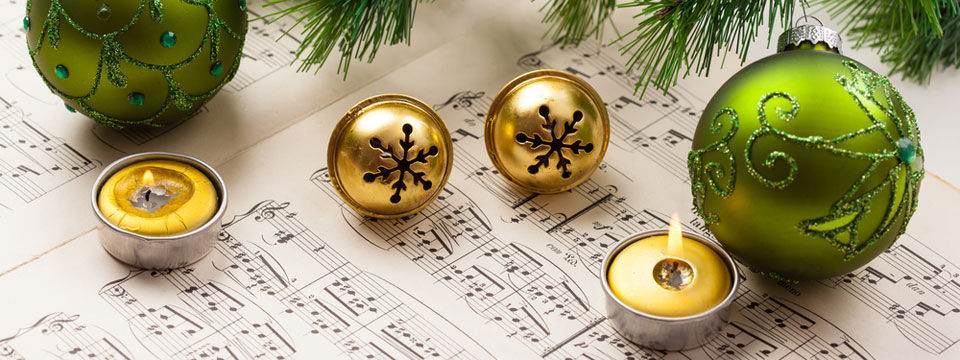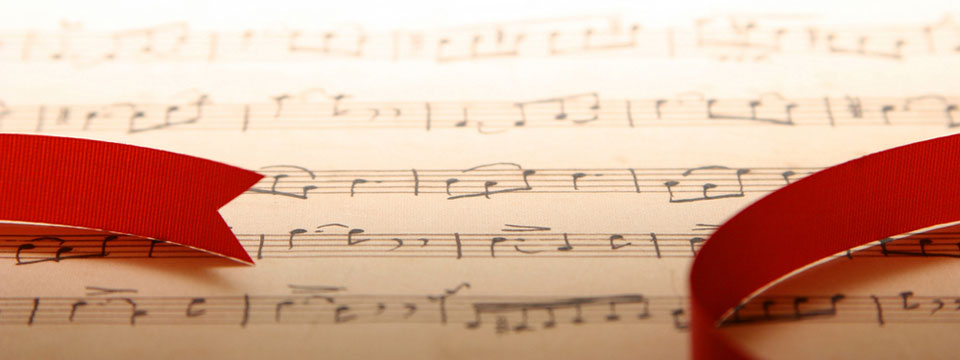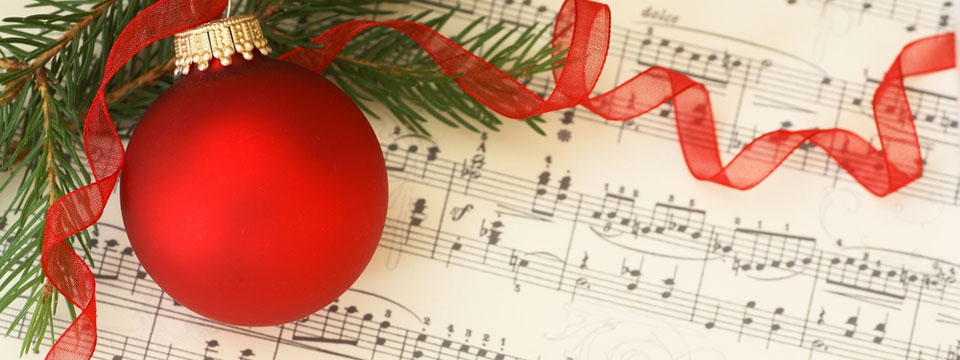
by Jaci Greggs | Dec 24, 2014
I love Christmas music. I will listen to Christmas music any time of the year. I think any Christmas song or hymns worth singing in December is worth singing all year ’round. I’d like to share some of my favorites as we anticipate Christmas, and my hope is that studying their history and inspiration will help make our Christmas celebrations even more exciting and worshipful this year.
Angels are a tricky subject. Born in the 80s and a child of the 90s, I remember well the fascination with guardian angels. Angels play an important role in the Christmas story, and so naturally have several hymns that focus on their part. “Angels We Have Heard On High” and “Angels from the Realm of Glory” are two that immediately come to mind.
While those other two hymns focus more on the angels themselves, and while they are very pretty and fun to sing, I like how “Hark! The Herald Angels Sing” keeps the singer’s attention on the Jesus himself, with the angels specifically being referenced only for their part in announcing his arrival.
The origins of the hymn are easier to trace than some others. The lyrics were written especially for Christmas by Charles Wesley in 1739 (and tweaked by George Whitefield, which is the version we’re most familiar with). Wesley, of course, is from the famous Methodist family, originally an Anglican from England who came to America. While he also participated in the open-air preaching his brothers were known for, Charles himself was a prolific hymnist. The Methodist hymn book has around 150 of his hymns in print still today! It appears that the tune is adapted from Mendelssohn, which would explain its grandeur.
Like the other Christmas hymns we’ve looked at, this one contains rich, distilled “soundbites” for singers to recite, memorize, and meditate on. This also has “surprise verses” that don’t often get a hearing in church services. Included below are the ones that were most common – although one version had as many as ten!
Now that I’ve read them all, I don’t know if I can be really satisfied to only sing the most common verses. “Veiled in flesh the Godhead see/Hail th’incarnate Deity/Pleased with us in flesh to dwell/Jesus our Emmanuel” proclaims the mystery of the incarnation. “Rise, the woman’s conqu’ring Seed/Bruise in us the serpent’s head” is a direct reference both to the Messianic prophecy of Genesis 3, as well as a plain acknowledgement of our sin nature. “Second Adam from above” points us to 1 Corinthians 15.
Let’s appreciate the opportunity we have in song to proclaim some of the great truths of Christmas!
Hark! The herald angels sing, “Glory to the newborn King; Peace on earth, and mercy mild, God and sinners reconciled!” Joyful, all ye nations rise, Join the triumph of the skies; With th’angelic host proclaim, “Christ is born in Bethlehem!”
Hark! the herald angels sing, “Glory to the newborn King!”
Christ, by highest Heav’n adored; Christ the everlasting Lord; Late in time, behold Him come, Offspring of a virgin’s womb. Veiled in flesh the Godhead see; Hail th’incarnate Deity, Pleased with us in flesh to dwell, Jesus our Emmanuel.
Hark! the herald angels sing, “Glory to the newborn King!”
Hail the heav’nly Prince of Peace! Hail the Sun of Righteousness! Light and life to all He brings, Ris’n with healing in His wings. Mild He lays His glory by, Born that man no more may die. Born to raise the sons of earth, Born to give them second birth.
Hark! the herald angels sing, “Glory to the newborn King!”
Come, Desire of nations, come, Fix in us Thy humble home; Rise, the woman’s conqu’ring Seed, Bruise in us the serpent’s head. Now display Thy saving power, Ruined nature now restore; Now in mystic union join Thine to ours, and ours to Thine.
Hark! the herald angels sing, “Glory to the newborn King!”
Adam’s likeness, Lord, efface, Stamp Thine image in its place: Second Adam from above, Reinstate us in Thy love. Let us Thee, though lost, regain, Thee, the Life, the inner man: O, to all Thyself impart, Formed in each believing heart.
Hark! the herald angels sing, “Glory to the newborn King!”
works consulted:
http://cyberhymnal.org/htm/h/h/a/hhangels.htm
http://en.wikipedia.org/wiki/Hark!_The_Herald_Angels_Sing
http://www.carols.org.uk/hark_the_herald_angels_sing.htm
http://en.wikipedia.org/wiki/Charles_Wesley

by Jaci Greggs | Dec 16, 2014
I love Christmas music. I will listen to Christmas music any time of the year. I think any Christmas song or hymns worth singing in December is worth singing all year ’round. I’d like to share some of my favorites as we anticipate Christmas, and my hope is that studying their history and inspiration will help make our Christmas celebrations even more exciting and worshipful this year.
They say familiarity breeds contempt, but they could also say it breeds apathy. I think this is one of the pitfalls of many of our great Christmas hymns. We’re so used to the habit of singing them in December (and only December) that it often becomes more of a ritual than an act of worship. In the various churches we’ve attended the last few years, it hasn’t been unusual to even see the music minister shift gears into “autopilot” mode when the obligatory Christmas song pops into rotation among the “real” worship songs.
This is tragic. There is great emotional and doctrinal wealth in Christmas hymns. “O Come, All Ye Faithful” is a great example.
“Adeste, Fideles,” in the original Latin, has no known author, although theories abound as to its origin. There are even political theories alleging that the hymn was a secret reference to the birth of Charles III. This is pretty difficult to reconcile with phrases such as, “Jesus to thee be glory given.” Considering Charles III would have been born as many as 20 years before “Adeste, Fideles” appears, that seems unlikely.
The second verse is not as well-known, but I included it here because it is in the original. While “born the King of Angels” is a strange phrase (I wouldn’t say inaccurate, since He is first over all creation, just an uncommon sentiment) there are other places where the Scriptural inspiration for the lyrics are obvious. For example, in that second verse, “Very God, begotten, not created,” echoes John 3:16 and Colossian 1:15-16, affirming Christ’s deity. “Word of the Father, now in flesh appearing” is an obvious reference to John 1:1.
While the song is literally set on the night of Christ’s birth, figuratively the calls to action are still immediate in 2014. Let us come, let us adore Him! But not passively, in December rote, waiting to get to the “real” worship songs. Let us do it intentionally, proactively, enthusiastically – proclaiming the truth in fully-engaged praise to Christ, the Lord!
O come, all ye faithful, joyful and triumphant!
O come ye, O come ye to Bethlehem;
Come and behold him
Born the King of Angels:
O come, let us adore Him
O come, let us adore Him
O come, let us adore Him
Christ the Lord.
God of God, light of light,
Lo, he abhors not the Virgin’s womb;
Very God, begotten, not created:
O come, let us adore Him
O come, let us adore Him
O come, let us adore Him
Christ the Lord.
Sing, choirs of angels, sing in exultation,
Sing, all ye citizens of Heaven above!
Glory to God, glory in the highest:
O come, let us adore Him
O come, let us adore Him
O come, let us adore Him
Christ the Lord.
Yea, Lord, we greet thee, born this happy morning;
Jesus, to thee be glory given!
Word of the Father, now in flesh appearing!
O come, let us adore Him
O come, let us adore Him
O come, let us adore Him
Christ the Lord.
Works consulted:
http://en.wikipedia.org/wiki/Adeste_Fideles
http://www.hymnsandcarolsofchristmas.com/Hymns_and_Carols/Notes_On_Carols/adeste_fideles.htm

by Jaci Greggs | Dec 10, 2014
I love Christmas music. I will listen to Christmas music any time of the year. I think any Christmas song or hymn worth singing in December is worth singing all year ’round. I’d like to share some of my favorites as we anticipate Christmas, and my hope is that studying their history and inspiration will help make our Christmas celebrations even more exciting and worshipful this year.
Silent Night was originally a poem, written by Austrian Catholic priest Joseph Mohr. Mohr was a man of lowly background who had a heart for the poor and needy. One of his personal projects was to arrange a program for linking the destitute up with farmers for room and board.
Mohr wanted a new hymn for his midnight Christmas Mass, so he took his poem to musician Franz Xaver Gruber to give it a melody. Together, they played the hymn for the first time at Christmas Mass in 1818. Forty years later, it was translated to English, and has since circled the globe as a Christmas service mainstay.
While anyone who has been in a delivery room might question the words “all is calm, all is bright,” there’s something very powerful about letting “Jesus, Lord at thy birth” resonate in one’s throat. It’s so worth meditating on, Mohr repeats it twice. Consider the magnitude of phrases such as “the dawn of redeeming grace.” My favorite renditions of this song make the final refrain – “Christ the Savior is born” – something of an anthem, a celebratory declaration.
While the soothing tones and deliberate pacing could make “Silent Night” seem plodding, under the right direction it is contemplative, methodical, and yes, rejoicing. Christ the Savior IS born! And it’s worth repeating – Christ the Savior is born!
Silent night, Holy night All is calm, all is bright Round yon virgin, mother and child Holy infant, tender and mild Sleep in heavenly peace, Sleep in heavenly peace.
Silent night, Holy night Son of God, love’s pure light Radiant beams from thy holy face With the dawn of redeeming grace, Jesus, Lord at thy birth Jesus, Lord at thy birth.
Silent night, Holy night Shepherds quake, at the sight Glories stream from heaven above Heavenly, hosts sing Hallelujah. Christ the Savior is born, Christ the Savior is born.
works consulted:
http://www.stillenacht.at/en/mohr.asp

by Jaci Greggs | Dec 4, 2014
I love Christmas music. I will listen to Christmas music any time of the year. I think any Christmas song or hymns worth singing in December is worth singing all year ’round. I’d like to share some of my favorites as we anticipate Christmas, and my hope is that studying their history and inspiration will help make our Christmas celebrations even more exciting and worshipful this year.
One of the most popular and recognized Christmas hymns, “Joy to the World,” was written by Isaac Watts, a pastor who wanted to make the Psalms relevant and meaningful to the Christians of his day. He took the images in Psalm 98 and created the lyrics for the hymn we know today.
Isaac Watts was a pastor, but he was also a logician and a poet. He felt it was important for Protestant Christian hymns to be both doctrinally sound and emotionally personal to the individuals singing them. Another great work of his, “When I Survey the Wondrous Cross,” is a great example of his ambition in this regard.
It’s fairly common knowledge that this hymn we enjoy so much around Christmas time wasn’t actually written to celebrate Christ’s birth, but rather to anticipate the celebration at His Second Coming. And yet, it’s enthusiasm, anticipation, and jubilation has made it a fixture for Christmas services every year.
Psalm 98 tells us to shout for joy to the Lord – and not just people, but all of creation. Rivers clap their hands, mountains shout for joy. Watts captured this inherent celebration in creation in his hymn, and we can be reminded that Heaven AND Nature sing with us to praise the Lord and give him glory every single day.
Verse 1
Joy to the world! the Lord is come; Let earth receive her King; Let every heart prepare him room, And heaven and nature sing, And heaven and nature sing, And heaven, and heaven, and nature sing.
Verse 2
Joy to the earth! the Savior reigns; Let men their songs employ; While fields and floods, rocks, hills, and plains Repeat the sounding joy, Repeat the sounding joy, Repeat, repeat the sounding joy.
Verse 3
No more let sins and sorrows grow, Nor thorns infest the ground; He comes to make His blessings flow Far as the curse is found, Far as the curse is found, Far as, far as, the curse is found.
Verse 4
He rules the world with truth and grace, And makes the nations prove The glories of His righteousness, And wonders of His love, And wonders of His love, And wonders, wonders, of His love.

by Jaci Greggs | Nov 12, 2014
I remember that old children’s church song with the silly hand motions mostly for helping me remember the difference between “cavalry” and “Calvary.” (I had no idea at the time how integral both of those words would become to my vocabulary!) At the time, it was just a song we sang and then moved on to “Father Abraham,” so I never really understood the concept. No one spent much time explaining why we were in the Lord’s army, why there was an army anyway, and what that army was supposed to look like.
Now, after living the Army life for some years, I’m able to see the comparisons.
– Maintaining Readiness A soldier has to maintain battle readiness at all times. Daily physical training, regular weapons proficiency testing, and special skill development are a constant in military life. The Bible tells Christians to “always be prepared” (1 Pet. 3:15). Without the intentional effort to be part of a local Christian community, to train our minds with consistent personal Bible study, and to maintain fellowship with God through regular prayer and confession of sin, we will not maintain spiritual readiness to face the battles of life, or to minister to our unbelieving friends and neighbors.
– Surrendering Your Rights A soldier can request where his next duty assignment (base) is, but ultimately the decision is up to the Army. When a family arrives at a new base, they can request government housing, but it’s not always available or even available immediately. Ultimately, the course a soldier’s life takes is only marginally up to him or her. The soldier exists to serve the interests of the military and the nation. In the same way, Christians are to submit their desires to the will of God. Many parents have sent their children around the world, not knowing if or when they would see them again, for the sake of the Gospel. And history is full of saints who have given their lives in lands around the world so that others would hear and see the extent to which God loves them.
– Making War When soldiers are deployed, they carry their weapons on them at all times. They wear body armor. They are constantly on alert and aware of their surroundings. They are living in a war zone. When they are “in garrison” (stateside) they don’t practice the same habits on a daily basis. Unfortunately, Christians often default to the “garrison” mentality. Extreme pacifist Christians latch onto verses that instruct us to “be still,” “wait on the Lord,” and point to Ancient Israel’s submission in captivity as evidence that passive contentment is the only appropriate Christian response to trials and hardships. This, of course, ignores the multiple instructions contained in the New Testament towards Christians reminding us we live in a (spiritual) war zone. Ephesians 6 tells us to put on our spiritual body armor. 1 Thessalonians commands us to pray without ceasing. Jude instructs us to contend earnestly for the faith. Ephesians 5 tells us to expose evil works around us.
We are not living in garrison here on earth. In the same way that a soldier is always mindful of how to best serve the mission, let us always remember that our mission won’t end until we are in Heaven.




